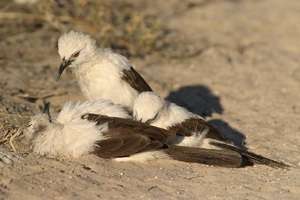Loner birds eavesdrop on others for survival

Eavesdropping in the wild – or the ability to gather information from other species – could influence the survival of some animal species.
That's the finding by scientists studying the eavesdropping or 'public information parasitism', of birds in southern Africa's Kalahari Desert and published in the British Ecological Society's Functional Ecology Journal.
The team, led by UWA's Amanda Ridley, used data from behavioural observation and playback experiments collected between November 2011 and April 2012 to compare the behavioural change in the scimitarbill and the pied babbler in the Kuruman River Reserve.
The study population consisted of 18 habituated groups of pied babblers encompassing more than 25 scrimitarbill breeding pairs.
The report explains scimitarbills are 'not cooperative'—they breed in pairs, forage alone and importantly do not display sentinel behaviour.
In contrast, pied babblers are a 'cooperatively breeding species' with a well described sentinel system where one member perches above the group and remains vigilant for predators while the rest of the group forages.
Dr Ridley says the scimitarbills underwent significant behavioural changes in the presence of social pied babblers. In contrast, pied babblers did not show significant behavioural changes to the presence or alarm calls of scimitarbills.
She says by eavesdropping and responding to the alarm calls of a species that is very good at detecting predators, the scrimitarbills were able to spend more time foraging and increased their biomass intake.
"In addition they reduced their vigilance rate by over 60 per cent and importantly – individuals were even able to expand their foraging niche – venturing out to forage in the open, something a solitary individual would not do because they are too exposed to predators," she says.
"Eavesdropping is a much more efficient way of gaining important information than relying on your own senses the whole time.
"This is because if you can eavesdrop on others, you don't have to spend as much time yourself keeping an eye out for predators.
"So eavesdropping allows animals to spend more time on other tasks, and less time being 'on the lookout'."
Dr Ridley says in the long term, research on the benefits of this behaviour in terms of body mass, mate acquisition and reproductive success for example, will provide important evolutionary insights into the adaptive benefits of interceptive eavesdropping.
More information: onlinelibrary.wiley.com/doi/10 … -2435.12153/abstract
Provided by Science Network WA




















